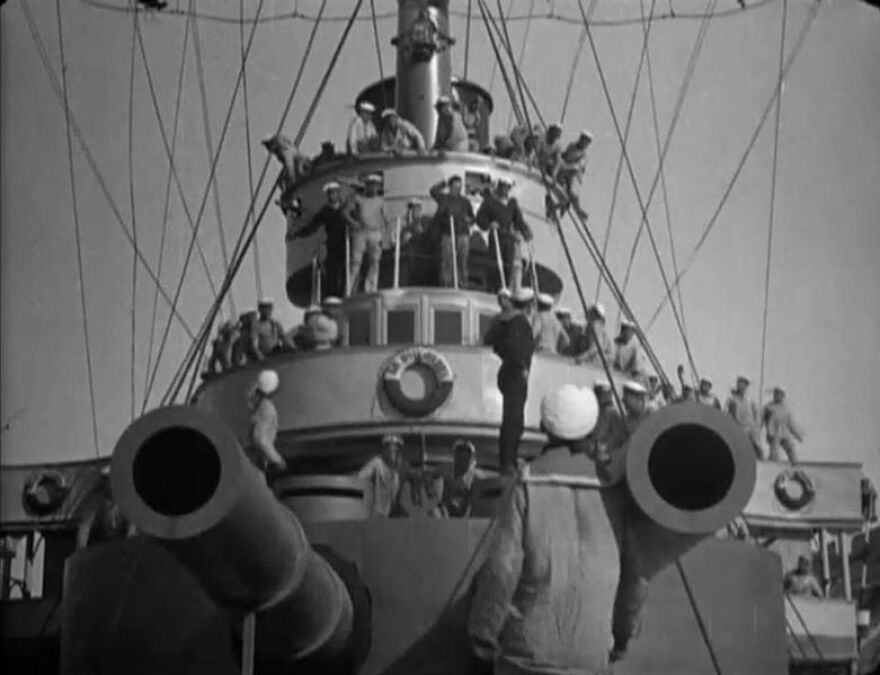People’s Liberation Big Band of Greater Kansas City doesn’t intend to inspire a revolution with their upcoming performance. They’re not even aiming for civil unrest.
No, the band’s leader, Brad Cox (piano and accordion) says they just wanted to compose a new score for a really beautiful old film, “Battleship Potemkin,” but in the band’s own style, what Cox describes as “modern freaky jazz.”
The 1925 Russian silent movie, which some people consider one of the best films ever made, tells the story of mutiny aboard a battleship which leads to a popular uprising against the Tsar. It was initially banned in France, England, Germany, and the United States for its subversive nature.
Cox, who is also one of the band’s four composers, says he doesn’t think modern audiences will find the film dangerous or subversive. It might even seem “quaint,” he says.
“I see this film, and our music supporting it, as a story about the human aspects of revolution rather than the political,” he says. “As I see it, the performance we’re presenting is ultimately about dignity and respect for all people.”
The band’s original intent was to perform their score to a showing of the movie every year on International Workers’ Day (May 1), but the logistics of that haven’t worked out. So, they were excited this year when Crown Center’s Musical Theater Heritage, in a space that used to be a movie theater, approached them about hosting a performance.
Jeff Harshbarger, who composed a section of the score, says the space will be great for their audience as well as participating band members. (During their regular first Sunday Record Bar shows, they sometimes have as many as 16 musicians on stage, but they scored this particular piece for only 11.)
Harshbarger has been the bassist for the People’s Liberation Big Band since its inception in about 2007. For his section of the score, he chose the part where the sailors mutiny. He had to figure out how to frame the chaos in a way that would still allow for free improvisation.
“Every character in this scene has his own theme and own musician that correlates,” Harshbarger says. Whenever the correlating musician sees his character on the screen, “they have to play his little moment while improvising the action that’s happening around us.”
In the mutiny scene, the sailors are at the tipping point. The officers are trying to force soup on them that contains rotting meat, and this indignity is the last straw.

“There’s just this bubbling of energy on the deck of the ship, and you have no idea which way it’s going to go — if the men are going to win or if they’re going to get put down again by the officers,” Harshbarger says. “I love that tension, and I thought free jazz and motivic development was the way to deal with it.”
Neither Cox nor Harshbarger says the sound quite comes across as traditional jazz, even though they’re improvising and listening to each other the way jazz musicians do.
“There are certain roles that the instruments will typically play in a jazz ensemble that makes people think this is jazz music,” Cox says. “When people start playing different roles, like in chamber music, the drum-set player, instead of keeping the beat as he would in a normal jazz ensemble, maybe his role becomes providing different timbral colors and things like that.”
Even if “Battleship Potemkin” doesn’t “rile us up today as a society,” Cox says, it might spark something. The movie has strong themes of inequality and government corruption.
“Unfortunately, in our current climate, there probably is something political about saying that all people should be treated with respect,” he says, “rather than that just being a moral no-brainer.”
“This country has never seen class warfare,” adds Harshbarger. “Class warfare is a true revolution, blood running down the streets. We don’t want anything to do with that. That is not our message.”
People's Liberation Big Band of Greater Kansas City, 8 p.m., Saturday, May 11 at Musical Theater Heritage Crown Center, 2450 Grand Blvd., Suite 301, Kansas City, Missouri 64108. Tickets $20.
Follow KCUR contributor Anne Kniggendorf on Twitter, @annekniggendorf.




